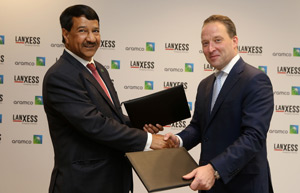LANXESS
Half of rubber carve-out to be sold to Aramco / Joint Venture set to start in Q1 2016 / First back integration for German producer / Farther-reaching Middle East projects envisaged
 Lanxess chairman Matthias Zachert (right) and Abdulrahman F. Al-Wuhaib, senior vice president Downstream at Saudi Aramco, at the signing ceremony (Photo: Lanxess) |
In a long-awaited deal, Lanxess (Cologne / Germany; www.lanxess.com) has agreed to sell a 50% stake in its carved-out synthetic rubber business to Saudi Aramco Overseas Company, a subsidiary of the Saudi Arabian oil giant Saudi Aramco (Dhahran; www.saudiaramco.com) – see Plasteurope.com of 11.08.2015. Together, the two companies will establish an as yet unnamed 50:50 joint venture with annual sales of EUR 3 bn and an enterprise value of EUR 2.75 bn. The transaction is due to close in the first quarter of 2016 following anti-trust approval.
Aramco will pay Lanxess around EUR 1.2 bn in cash for the stake, after deduction of debt and other unspecified financial liabilities. The German chemicals and engineering plastics group will continue to have operational control of the business, which will be steered by a holding in The Netherlands and comprise its former Specialty Rubber and High Performance Elastomers units, along with their supporting administrative functions. Lanxess will also name the joint venture’s CEO and consolidate its financial results. Its own CEO, Matthias Zachert, will chair the supervisory board. Aramco will name the CFO.
The new company’s rubber portfolio will include Lanxess’ “Keltan” elastomers (EPDM) unit, based largely on assets acquired from DSM in 2010, and its technical products “Baypren”, “Levapren”, “Therban” and “Baymod” inherited in the 2007 split from former parent Bayer. The high-performance products are sold not only to the tyre and automotive markets but are used also by the construction and oil & gas industries.
In a conference call, Zachert noted that Lanxess – the world’s largest producer of synthetic rubber – was the last major non-integrated producer. Competitor ExxonMobil cooperates with Saudi Arabia’s Sabic, while Versalis and Michelin collaborate with Indonesian petrochemical company Chandra Asri. The link with Aramco, Zachert said, will provide Lanxess with “competitive and reliable access” to strategic raw materials when its existing supply contracts expire in three to four years.
In future, the links between Lanxess and Aramco could extend beyond the current parameters, Zachert hinted in explaining the rationale behind the new alliance. He said the companies also envisage broader up- and downstream projects similar to those being pursued in the Middle East by Aramco in cooperation with Dow Chemical in Sadara and the Satorp collaboration with French oil and petrochemical group Total. If the high-flying plans are realised, Lanxess – in theory, at least – could become more deeply involved in the plastics sector than currently with its two engineering polymers businesses producing PA and PBT.
Aramco will pay Lanxess around EUR 1.2 bn in cash for the stake, after deduction of debt and other unspecified financial liabilities. The German chemicals and engineering plastics group will continue to have operational control of the business, which will be steered by a holding in The Netherlands and comprise its former Specialty Rubber and High Performance Elastomers units, along with their supporting administrative functions. Lanxess will also name the joint venture’s CEO and consolidate its financial results. Its own CEO, Matthias Zachert, will chair the supervisory board. Aramco will name the CFO.
The new company’s rubber portfolio will include Lanxess’ “Keltan” elastomers (EPDM) unit, based largely on assets acquired from DSM in 2010, and its technical products “Baypren”, “Levapren”, “Therban” and “Baymod” inherited in the 2007 split from former parent Bayer. The high-performance products are sold not only to the tyre and automotive markets but are used also by the construction and oil & gas industries.
In a conference call, Zachert noted that Lanxess – the world’s largest producer of synthetic rubber – was the last major non-integrated producer. Competitor ExxonMobil cooperates with Saudi Arabia’s Sabic, while Versalis and Michelin collaborate with Indonesian petrochemical company Chandra Asri. The link with Aramco, Zachert said, will provide Lanxess with “competitive and reliable access” to strategic raw materials when its existing supply contracts expire in three to four years.
In future, the links between Lanxess and Aramco could extend beyond the current parameters, Zachert hinted in explaining the rationale behind the new alliance. He said the companies also envisage broader up- and downstream projects similar to those being pursued in the Middle East by Aramco in cooperation with Dow Chemical in Sadara and the Satorp collaboration with French oil and petrochemical group Total. If the high-flying plans are realised, Lanxess – in theory, at least – could become more deeply involved in the plastics sector than currently with its two engineering polymers businesses producing PA and PBT.
24.09.2015 Plasteurope.com [232269-0]
Published on 24.09.2015

 German version of this article...
German version of this article...